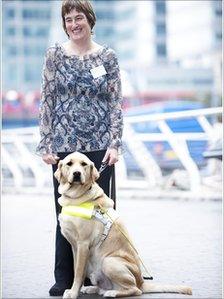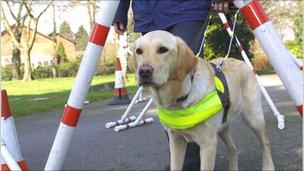Guide dog's prize for sensing fit
- Published

Gino has been with Maxime for more than a year
Gino, a three-year-old golden retriever/Labrador cross has been named guide dog of the year for helping alert people to a man who was having an epileptic fit on a bus.
His owner, Maxine Ingrame, from Kidwelly, in Carmarthenshire, is blind and has severe epilepsy. She noticed when she first trained with Gino that as well as guiding her wherever she needed to go, he had another potentially life-saving gift.
Gino had not been trained to spot the signs of epilepsy, but he started barking whenever Maxine was on the point of having a fit.
While Maxine is disorientated, he will lead her to somewhere safe, or if she cannot walk, he barks constantly until he attracts help.
He won the guide dog prize for barking when a stranger was close to fitting on a bus. He was barking until the driver stopped, and who then sought medical help before the man's condition became too serious.
She said: "Nobody knows how he does it. He'd never even been around an epileptic until I got him.
"However he does it, it's a really big peace of mind for me, and gives me the confidence to go further and longer than I would have done before."
The award comes as Cardiff's guide dog centre celebrates its 25th anniversary, with a flag day in Cardiff city centre this Saturday, followed next month by a sponsored hike up Pen-y-Fan, in the Brecon Beacons.
Until 1985 the Guide Dog for The Blind Association's (GDBA) work was centralised at their headquarters in Leamington Spa.
But after the success of the Cardiff model, GDBA was convinced of the benefit of establishing 28 regional teams all over the UK. Of the approximately 3,000 dogs and owners who've been matched and trained at Cardiff, the vast majority have been Labradors, retrievers, or crosses between the two.

Training techniques have changed over the past 25 years
However some of the more unusual dogs to pass out include German shepherds, collies, newfoundlands and rottweilers.
The fundamental principles of training the dogs - using usually food inducements to train puppies to walk to heel, stop at curbs, and building up to more complex obstacles - have remained unchanged.
South Wales district team manager Katie Roberts said Cardiff helped to pioneer a change in the way they approached the owners.
"Part of the success of the district teams has been to focus more closely on the needs of the individual owners as well as the dogs."
"Gone are the rigid rules, months away from home, boarding school-type accommodation, and one-size-fits-all approach.
"Twenty-five years ago Cardiff showed how the system can work on a local level, with people being trained from home, and today we're still at the forefront of improving the experience for dogs and owners alike."
GDBA is also the biggest UK sponsor of research into sight-related conditions, and one of the most powerful disability rights lobbying groups in the UK.
In 2010 almost every developed country has a guide dog organisation based on the British model.